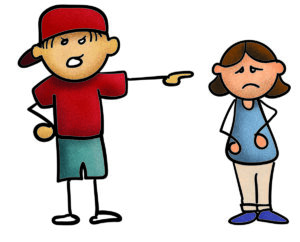As our bullying workbook launches, I’ve been thinking about the kids that I have met as a social coach that, for whatever reason, lead in their peer interactions with an attitude of meanness. It seems to be a part of their demeanor (and why they are with me working on improving their social skills). These kids shoot nasty remarks from their mouth before they even know the entire scenario they are reacting to. An example: one kid touches something the other kid had been using, and then instead of checking in to see what the other child is doing, they start screaming that someone is “stealing” their stuff. The other kid who was just interested in something that had been left sitting there looks hurt and bewildered.
These kids will say mean things that go way above the need for the situation. You will also hear a lot of, “You’re cheating!” or something along those lines when things don’t go their way. I’ve had kids say things that I won’t repeat here, but suffice it to say; it can be evident why these kids don’t have many friends. They also don’t have a lot of social collateral to begin with, and are frequently a provocative victim. These are kids who may appear to be bullies themselves but don’t have the social know-how that real bullies have and become victims themselves when they push the limits of what other kids can take from them.
I also observe that many of these kids are either fully aware of what they are doing and seem to enjoy being mean and the reaction they receive; yet others are completely unaware of how they come across to other kids. I talk to them about how being “nice” gets “nice” in return and being “mean” gets “mean” in return. We can also describe to kids the actions or behaviors that are problematic by saying things such as, “that sounded mean, did you want to sound that way?” or “that (action) was very unkind, it will be tough to make friends if you keep doing (action).”
Over my 17+ years as a social coach, while I have worked with kids who consistently choose to be mean over nice, I have also seen kids be able to recognize their de” mean” or, turn it around, and develop better peer relationships.


